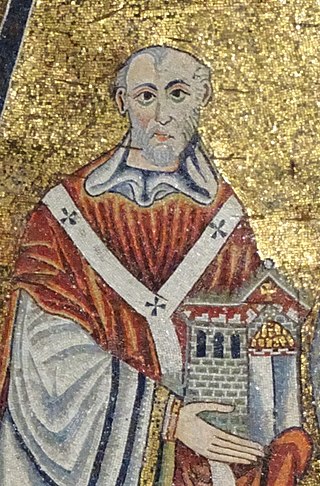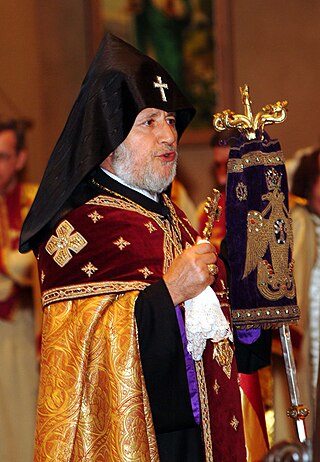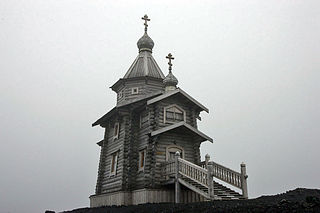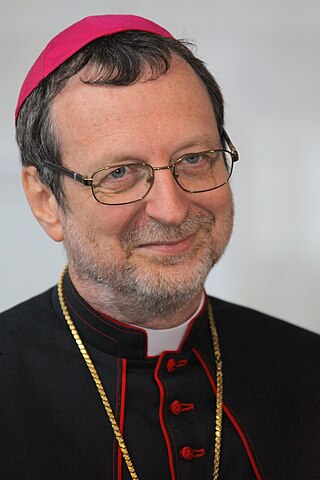| |||||
| Decades: | |||||
|---|---|---|---|---|---|
| See also: | Other events of 2001 List of years in Armenia | ||||
The following lists events that happened during 2001 in Armenia .
| |||||
| Decades: | |||||
|---|---|---|---|---|---|
| See also: | Other events of 2001 List of years in Armenia | ||||
The following lists events that happened during 2001 in Armenia .

Canonization is the declaration of a deceased person as an officially recognized saint, specifically, the official act of a Christian communion declaring a person worthy of public veneration and entering their name in the canon catalogue of saints, or authorized list of that communion's recognized saints.

Pope John Paul II was head of the Catholic Church and sovereign of the Vatican City State from 1978 until his death in 2005.

Pope Innocent II, born Gregorio Papareschi, was head of the Catholic Church and ruler of the Papal States from 14 February 1130 to his death in 1143. His election as pope was controversial and the first eight years of his reign were marked by a struggle for recognition against the supporters of Anacletus II. He reached an understanding with King Lothair III of Germany who supported him against Anacletus and whom he crowned as Holy Roman emperor. Innocent went on to preside over the Second Lateran council.

The Catholicos of All Armenians is the chief bishop and spiritual leader of Armenia's national church, the Armenian Apostolic Church, and the worldwide Armenian diaspora. The Armenian Catholicos is also known as the Armenian Pontiff and by other titles. According to tradition, the apostles Saint Thaddeus and Saint Bartholomew brought Christianity to Armenia in the first century. Saint Gregory the Illuminator became the first Catholicos of All Armenians following the nation's adoption of Christianity as its official religion in 301 AD. The seat of the Catholicos, and the spiritual and administrative headquarters of the Armenian Church, is the Mother See of Holy Etchmiadzin, located in the city of Vagharshapat.

Doctor of the Church, also referred to as Doctor of the Universal Church, is a title given by the Catholic Church to saints recognized as having made a significant contribution to theology or doctrine through their research, study, or writing.

The Armenian Catholic Church is an Eastern Catholic particular churches sui iuris of the Catholic Church. It accepts the leadership of the bishop of Rome, and is therefore in full communion with the universal Catholic Church, including the Latin Church and the 22 other Eastern Catholic Churches. The Armenian Catholic Church is regulated by Eastern canon law, summed up in the Code of Canons of the Eastern Churches.

Grigor Narekatsi was an Armenian mystical and lyrical poet, monk, and theologian. He is venerated as a saint in the Armenian Apostolic and Catholic Churches and was declared a Doctor of the Church by Pope Francis in 2015.
The history of the Catholic Church is integral to the history of Christianity as a whole. It is also, according to church historian Mark A. Noll, the "world's oldest continuously functioning international institution." This article covers a period of just under two thousand years.

Catholicos Garegin II is the Catholicos of All Armenians, the supreme head of the Armenian Apostolic Church, since 1999. In 2013 he was unanimously elected the Oriental Orthodox head of the World Council of Churches for the next eight years.
Florian "Floriano" Abrahamowicz is an Austrian priest who was formerly the Prior of the Society of St. Pius X in northeastern Italy. He was expelled from the Society in February 2009 for expressing numerous conspiracy theories, including Holocaust denial.

Holy See–Turkey relations are foreign relations between the Holy See and Turkey. Both countries established diplomatic relations in 1868, originally between the Holy See and the Ottoman Empire. The Holy See has a nunciature in Ankara. Turkey has an embassy in Rome.
The division between the Oriental Orthodox Churches and the Catholic Church can be traced to the years following the Council of Chalcedon (451) whose Christological teaching the Oriental Orthodox did not accept. Attempts were made to reconcile with some of the Oriental Orthodox Churches at the Council of Florence (1438–1445), but none of these provided a lasting solution. Relations began to improve dramatically, however, after the Catholic Church's Second Vatican Council (1962–1965). There were several important exchanges of visits between Popes and heads of the Oriental Orthodox Churches, and semi-official theological conversations sponsored by the Pro Oriente Foundation in Vienna. This process of reconciliation led to the establishment of an official dialogue between the Catholic and Oriental Orthodox Churches in 2003.

The Saint Gregory the Illuminator Cathedral, also known as the Yerevan Cathedral is the largest cathedral of the Armenian Apostolic Church. It is located in the Kentron District of Yerevan, the capital of Armenia, and is one of the largest religious buildings in the South Caucasus along with the Holy Trinity Cathedral of Tbilisi. Adjacent to the General Andranik metro station, it is visible from many areas of Yerevan.

Christianity in the 21st century is characterized by the pursuit of church unity and the continued resistance to persecution and secularization.

Georgia – Holy See relations are bilateral relations between Georgia and the Holy See. The diplomatic relations between the two were established on May 5, 1992. The Georgian Embassy to the Holy See is located in 25 Via Toscana, Rome. The Apostolic Nunciature is located in 40 Zghenti Street, Tbilisi.

Pope John Paul II created 231 cardinals in nine consistories held at roughly three-year intervals. Three of those cardinals were first created in pectore, that is, without their names being announced, and only identified by the pope later. He named a fourth in pectore as well but never revealed that name. At his 2001 consistory, where he elevated 42 prelates and announced the names of two created in pectore earlier, he created more cardinals at one time than ever before or since. His consistories in 1985, 1994, and 2003 were among the largest ever.

Peter Stephan Zurbriggen was a Swiss archbishop of the Catholic Church, who worked in the diplomatic service of the Holy See from 1993 until his retirement in 2018. He was Apostolic Nuncio to Austria from 2009 to 2018.

Claudio Gugerotti is an Italian Cardinal of the Catholic Church who was named prefect of the Dicastery for the Eastern Churches in November 2022. He previously worked in the diplomatic service of the Holy See, holding the position of nuncio in several eastern European countries between 2001 and 2020 and in Great Britain from 2020 to 2022. He joined the staff of the Dicastery for the Eastern Churches in 1985 and was its undersecretary from 1997 to 2001. He has been an archbishop since 2001. Pope Francis created him cardinal on 30 September 2023.